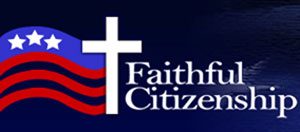The purpose of this web page is to give the St. Francis community a starting point to information on important legislative issues. VOTE! Around the issues of pregnancy and conception St. Francis affirms life!
The St. Francis Parish Life, Peace & Justice Committee members invite you to take action on specific legislative issues that are of interest to us as Catholics. Make it easy to sort through the candidates and issues before you enter the voting booth. During the months prior to an election, each of us must make decisions as to how we will vote, and, we seek to consider the important issues before voting.
The Catholic Church in the United States does NOT endorse candidates or political parties. It speaks only on issues. The official positions of the Church concerning the election are stated in the document Forming Consciences for Faithful citizenship and in documents issued by the Michigan Catholic Conference. All other documents and statements that you may come across are the opinions of individual Catholics and groups and may or may not represent the official teaching of the Church.
The Church has important wisdom to share on the issues, and, offers reflections on the various issues. These are the official positions of the Church. They are given to help you better form your consciences and to make decisions regarding the elections. We encourage you to read these articles. Ultimately, each person must make their own decision and vote as their conscience informs them. Hopefully the articles will help you in making those decisions.
Facilitating Advocacy in the Parish: CST requires us to be active participants in creating a more just society, economy, etc. Can we provide advocacy links on the parish website, so parishioners can easily locate and contact their elected representatives? Here are some sites we could link to:
– Federal:
- Find your U.S. Representative (by entering your zip code) – www.house.gov/representatives/find/
- Find your U.S. Senator (by entering your state) – www.senate.gov/general/contact_information/senators_cfm.cfm
– State:
- Find your State of MI Senator (by entering your address) – www.senate.michigan.gov/fysbyaddress.html
- Find your State of MI Representative (by entering your address or district number) – www.house.mi.gov/mhrpublic/
– Washtenaw County:
– City of Ann Arbor:
– City of Ypsilanti:
Follow MCC on Social Media for Election Information
Do you or your family members and friends use social media? If so, consider following the Michigan Catholic Conference on Twitter (www.twitter.com/MICatholicConf) and liking the Conference on Facebook (www.facebook.com/MichiganCatholicConference). Updates and information will be provided throughout this election season, and information related to legislative matters is posted each day. Michigan Catholic Conference is the official public policy voice of the Catholic Church in this state and is led by the state’s seven (arch) bishops. Connect with the MCC on Twitter and Facebook today!
Michigan Catholic Conference – youtube video.
Please see links below from the United States Conference of Catholic Bishops (USCCB) and other sources. For more information contact the Parish Office of Outreach Ministry: Life, Service + Justice, at justice@stfrancisa2.org or 734-821-2121.
Resources
Forming Consciences for Faithful Citizenship: A Call to Political Responsibility
United States Conference of Catholic Bishops (USCCB)
Legislative Advocacy Networks
The Michigan Catholic Conference (MCC) – Catholic Legislative Advocacy Network — Michigan Catholic Conference — youtube video. Additionally, bulletin inserts and homily notes.
Catholic Charities USA – legislative issues (Choose Advocacy then AdvoFax)

